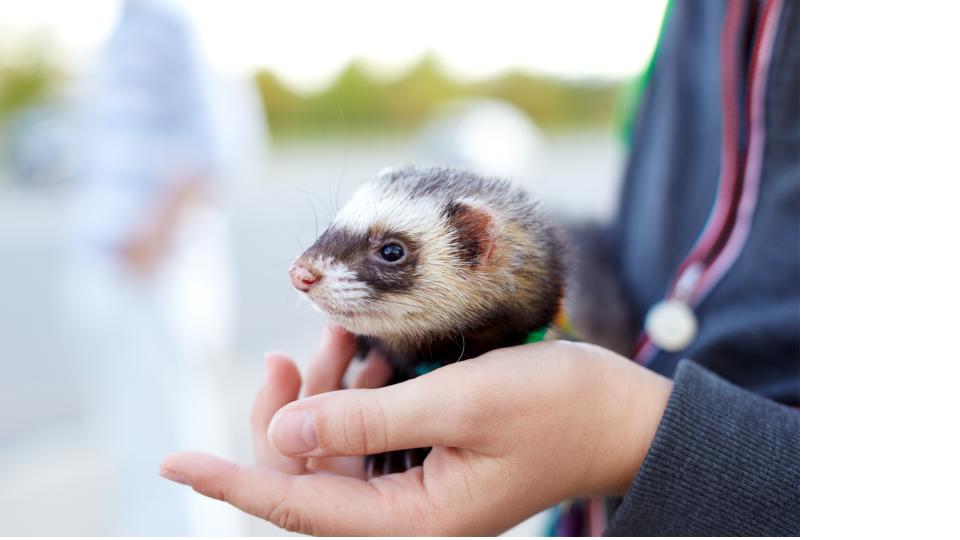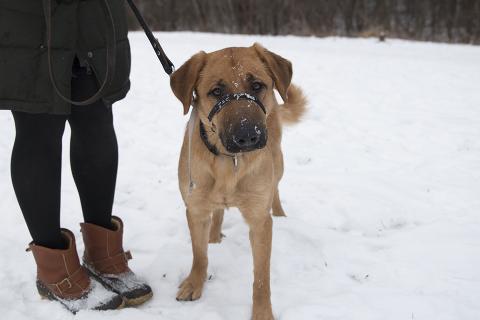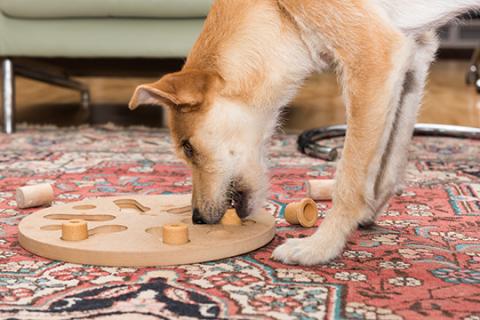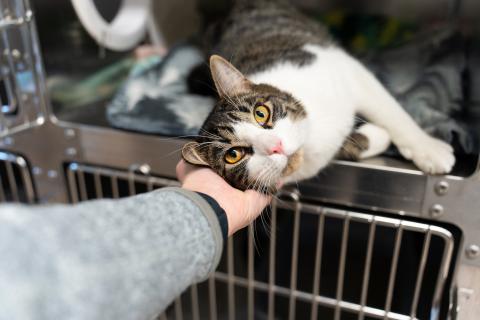
Ferrets are inquisitive, lively, and charming little creatures. Relatives to mink and weasles, ferrets are especially active and need lots of exercise. They're also super social and require a lot of human interaction. Although they sleep about 18 hours a day, they adapt their sleeping and active times to fit your schedule.
Ferrets have an average lifespan of 5-7 years.
Ferrets need annual physical examinations and vaccinations. Your new ferret may be susceptible to the list of illnesses below.
- Canine distemper: Canine distemper can be transmitted to ferrets directly from infected animals including dogs, foxes, raccoons, and other ferrets, or through contact with infected material such as shoes or clothing. A ferret that never leaves the house can have the distemper virus inadvertently brought to him by his owner. All ferrets should be vaccinated, even if they never step foot outside. The current recommendation is to have your pet vaccinated for canine distemper annually.
- Rabies: Rabies is caused by a virus that can affect many species of animals, including humans. The virus is shed in the saliva and transmission is usually through a bite wound. Since rabies is a human health issue, there are strict local and state regulations that govern the vaccination of most domestic pets for rabies.
- Human influenza: Ferrets are highly susceptible to the human influenza virus or the “flu.” They do not get common colds, which is caused by another set of viruses. Ferrets can get the flu from humans and humans can contract the flu from ferrets through contact with respiratory secretions. Adult ferrets develop a watery discharge from the eyes and nose, sneezing, coughing, and a fluctuating fever. Occasionally they also develop diarrhea. They feel miserable for a few days but usually recover uneventfully. Young ferrets can be more severely affected, so avoid handling young ferrets if you have the flu. Your veterinarian may prescribe medications to make your pet more comfortable.
- Choking: Ferrets normally make a “choking” or “reverse sneeze” sound that is a cross between a sneeze and a cough. It is quite loud and is often mistaken for a serious problem. This is the ferret's way of clearing foreign material out of its throat. This normal behavior will stop within a few seconds and occur occasionally on a daily basis. Another situation that is often mistaken for choking is when ferrets drool and paw at their mouths. This behavior is caused by such conditions as hypoglycemia (low blood sugar), nausea or foreign material in the mouth. None of these conditions will cause a ferret to suddenly collapse.
A ferret that is choking because of an obstruction to its windpipe will become very weak and collapse in a matter of seconds to minutes. The gums and tongue will be muddy to blue in color and the breathing will be erratic and then cease. Seek emergency assistance should this happen. - Foreign bodies in the stomach or intestine: Ferrets, particularly under a year of age, love to eat foam and latex rubber, which can become lodged in the intestine or stomach. In addition, ferrets older than one year of age can develop large masses of hair in the stomach, which can also cause an obstruction. All of these situations are dangerous and usually require surgery to remove the foreign material. Signs of a foreign body obstruction include lethargy, extreme dehydration, vomiting (but not usually), lack of stools, painful abdomen, seizures, and death. The best prevention for this problem is to adequately ferret-proof your environment as described in the section below on ferret housing.
- Skin Tumors: As ferrets age, they become more prone to developing lumps and bumps on their skin. Most of these lumps are neoplasms or tumors. Fortunately, they are usually benign, but it is best to have them removed nonetheless. The longer you wait to have them removed, the greater the possibility for complications.
- Adrenal Disease: This is a very common disease in ferrets two years of age and older. It is either a neoplasia (cancer) or hyperplasia (over-activity) of the adrenal glands, which are located near the top of the kidneys. These glands are part of the endocrine (hormone-producing) system of the body. For unknown reasons, ferret adrenal glands sometimes become diseased and can enlarge and cause pressure on surrounding tissues, such as the kidney and vena cava, and can also produce excessive amounts of androgens or sex hormones.
This overproduction of hormones results in a variety of symptoms, including loss of hair, increase in body odor, enlargement of the vulva in spayed females, return of the mating or aggressive urge in neutered males, and/or a dry brittle coat and itchy skin. In addition, some males can develop an enlargement of the prostate gland, which constricts urinary outflow. These ferrets have difficulty urinating and eventually may not be able to urinate at all. The treatment for adrenal disease is usually a combination of surgery to remove a portion or all of the adrenal glands and medical therapy.
Ferrets are obligate carnivores and their good health depends on a quality ferret diet that contains at least 34 percent animal meat protein and 22 percent fat. Local pet supply stores sell a variety of ferret diets. Cat and dog foods are not appropriate. Snacks, such as chicken or turkey, are recommended. Fruits and vegetables should be avoided because they are difficult to digest and may cause choking or gastrointestinal blockages. Egg whites (albumin) and raw onion can lead to hemolytic anemia.
The home cage should be a minimum size of 24” x 24” x 18” for up to two ferrets. The cage can be multi-level, but avoid steep ramps because ferrets are not natural climbers and could fall and injure themselves. Aquariums are not suitable cages for ferrets because of inadequate air circulation. Make sure the cage is made of a material that will be easy to clean and deodorize and is indestructible to the ferret digging in the corners.
Ferrets should not be caged 24 hours a day. Like cats, ferrets enjoy their naps and will often sleep 15 to 20 hours a day. But when awake, ferrets like to be active, so the more you entertain them, the happier — and less mischievous — they'll be. Ferrets love to crawl through almost anything, including PVC piping, cardboard boxes, paper bags, and even denim blue jeans.
Ferrets should be allowed in a supervised, ferret-proofed exercise area for a minimum of two hours a day. This exercise period can be all at once or divided up into two or three play periods. Make sure you block off all escape routes and remove toxic substances such as plants, household cleaners, insecticides, and rodenticides.
A sleeping area can be as simple as a soft towel, old shirt or cut-off trouser leg or blouse sleeve. There are now a wide variety of beds for ferrets sold at pet stores, such as cloth tubes, tents, and hammocks. Occasionally a ferret will chew on cloth, but this is usually baby behavior and most ferrets grow out of it. If your pet does chew on cloth, remove the item from the cage and use a small cardboard or wooden box with clean straw or hay for a sleeping area. After the ferret matures, try the cloth sleeping materials again.
Ferrets can be litter box trained about 85 percent of the time. A small low-sided box should be placed in the toilet area your pet has already used in its cage or exercise area. Do not use clay or clumping kitty litter in the box, because ferrets like to burrow and play in the clean litter and the dust from the clay is damaging to their fur. Use a thin layer of pelleted litter, which is cleaner and more absorbent. It's also non-toxic if swallowed and compostable in the garden.
Ferrets back up to a vertical surface to defecate and urinate, so make sure the litter material does not come to the top of the box, or all the waste material will drop over the side. Ferrets do not cover up their waste. It will be necessary to change the litter material several times a week to minimize odor. If the ferret is allowed to exercise over a large area of the house, place litter boxes in several locations.
In general, ferrets need very little grooming. They do not need to be bathed and over-bathing can actually cause dryness of the coat and skin. Ferrets have a natural musky odor to their skin, which will never be completely eliminated. They also have a heavy production of reddish-brown wax in their ears normally. You should avoid the urge to continuously remove this wax, as it has a protective function. In addition, continually putting cotton-tipped applicators into the ear may inadvertently push wax into the ear canal. Let the ferret clean its own ears by shaking its head and scratching from time to time.
Ferret nails can become sharp and may become entangled in carpeting or cloth. It will be necessary to trim your pet's nails every six to eight weeks to keep them in shape. Have an experienced person show you how to trim your pet's nails for the first time.
Domestic ferrets are generally easy to handle and are not aggressive. However, like all pets, they can become frightened and their first response may be to strike out and protect themselves with their teeth. For this reason, ferrets shouldn't be kept in households with children under six years of age.
Ferrets have poor eyesight and should never be placed in a situation where they might fall over the edge of a high surface. In addition, do not hold ferrets near your face, especially if you are not familiar with their behavior yet, because a nose can look like a really neat toy to grab onto if it comes towards the ferret suddenly. Most of the time you need only pick up your ferret and hold him in your arms to move him from place to place.
Sometimes it is useful to scruff your ferret in order to keep him still for certain procedures like giving medications, checking the ears, eyes or mouth, for bathing, or for trimming nails. To scruff a ferret, grab the skin along the back of the neck firmly and then hold the pet up so that the hind feet cannot touch the ground. Stroke the ferret's underside from top to bottom, which will relax your pet further. Most ferrets become very relaxed with this restraint method. Occasionally a younger ferret or a very frightened animal will object and you will not be able to use this hold.



